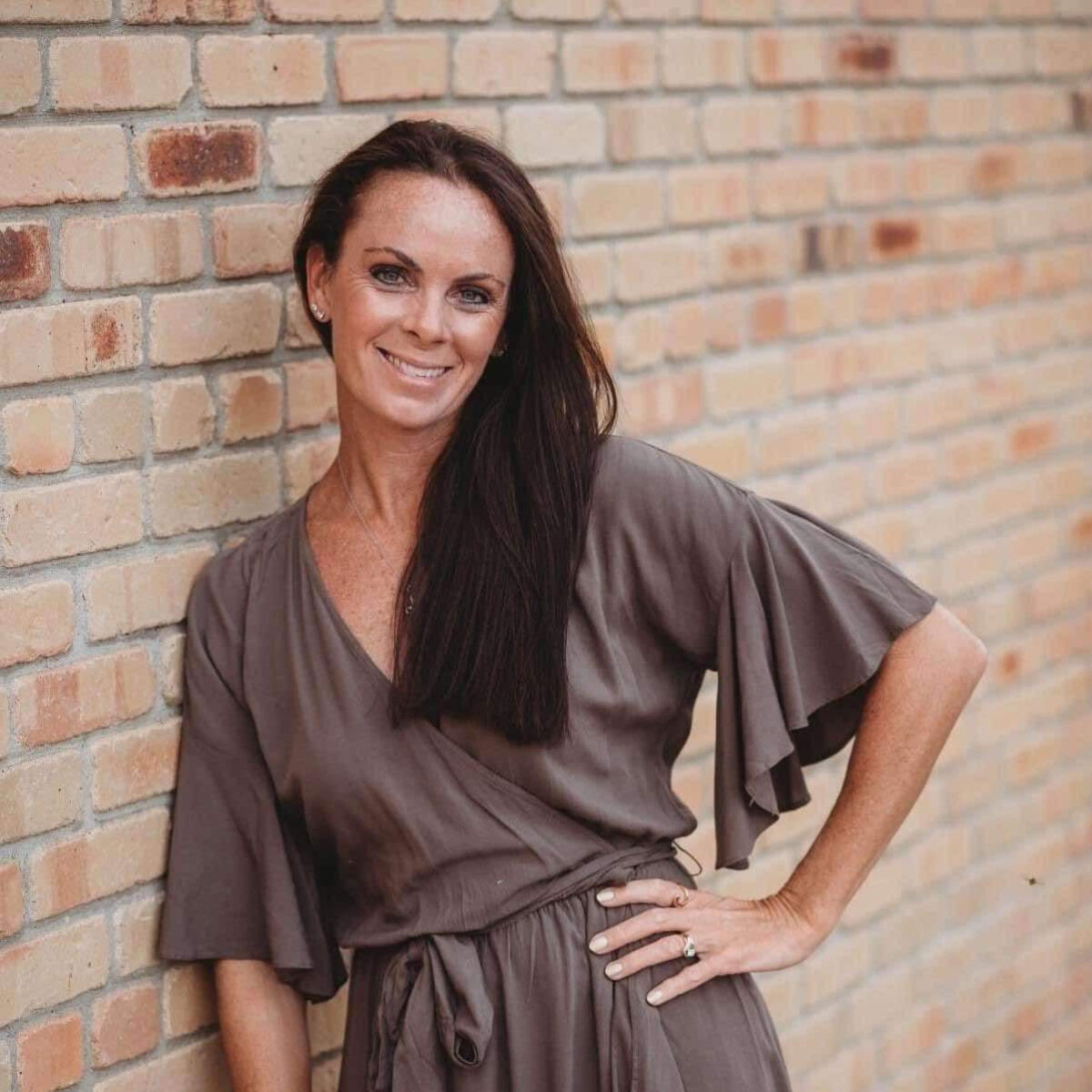My name is Lara Alspaugh, and I am a fifty-two-year-old wife, mother, daughter, sister, aunt, friend, and writer. I am a fitness enthusiast, a health nut who also loves a good lemon drop martini. I love to hike and work out I love being on the water on our boat. I love to travel, explore and be outside. A good sunset fills my soul, as does a deep conversation or a passing smile from someone I don’t know. My husband and three adult sons are my favorite people in the world, and I have had no greater privilege than being in their lives.
I am also a patient.
I am living with Ehlers-Danlos Syndrome—hyper mobility type, Ankylosing Spondylitis and Psoriatic Arthritis.
My first joint dislocation was at age ten, at fifteen debilitating back pain became a mainstay in my life. I thought pain was as common as the cold and didn’t really understand that not everyone lived like I did—hurting. It wasn’t until a general full body feeling of flu-like symptoms with overwhelming fatigue started to plague me at forty years old that I began to wonder if there was something really wrong.
My first visits with a rheumatologist were embarrassing at best and wildly humiliating at worst. I was told I was healthy—despite lab tests proving otherwise—my symptoms were dismissed and even mocked. I was left feeling as though I was crazy, that maybe I did just need a good psychiatrist—as was suggested to me. Still, I knew.
Something was wrong.
When I finally gathered the courage to try to find answers again, I got savvy. Instead of taking the referral that was handed to me, I did my own research. I outted my own symptoms to have conversations with anyone I knew who might have a lead, an idea, a friend-of-a-friend who could help me. It worked. Finally, after nearly a lifetime of discomfort and years of being dismissed, I found the right team. Having a doctor and physical therapist as committed to my health as I am has made all the difference in the world. Having a doctor and physical therapist who didn’t just listen but believed me saved my life. Of that I have no doubt.
5 Invisible Symptoms
- Pain: Pain every day, some days it consumes me and somedays I forget to notice as it is my constant companion. Still, it’s always there.
- Fatigue: If I’m honest, this is probably the piece I hate the most. I am often so tired I feel as though I’m floating outside of my own experience. As if I am sitting somewhere at a distance listening but not hearing, seeing but not feeling, a part of my life but then again not.
- Neuropathy: I trip, and fall, a lot. My left foot doesn’t always do what’s it’s supposed to and the numbness and tingling feeling I live with makes it feel fat and sluggish. It’s embarrassing, humbling. Fifty-two-year-olds shouldn’t fall, but I do. Pretty regularly.
- MS Hug: If you’re unfamiliar, the MS Hug isn’t exclusive to patients with MS. It is characterized by a tight squeezing of the chest area, often described as the feeling of a blood pressure cuff compressing around your torso. For me, it presents largely at nighttime, and the sensation is intense enough it often takes my breath away, leaving me with a panic laced pain that encircles me, forcing me to focus on rhythmic, deliberate breathing to manage. Living with chronic pain gives me a pretty high bar for what breaks me—but my MS hugs almost always bring me to tears, pulsing for seconds to minutes over the span of hours. I hate them, and the anxiety that comes at the first flutter of discomfort knowing what’s coming. I especially hate their name, nothing as comforting as a hug should be associated with that pain.
- Fear: I suppose some might call it anxiety, but my experience of fear is markedly different than how I experience anxiety. It’s fear that motivates me, requiring me to exercise, walk, stay in motion. It’s fear that keeps me hydrated and eating well. It’s fear that keeps me reading and researching and expanding the knowledge I have about what my disease profile looks like. It is fear that pushes me through pain and through fatigue and through falling and through infusions and through injections and through doctor’s appointments and through the days I think I’d just rather not get up. Fear of missing life, of my kids and husband being beholden to my disease and becoming a burden to those I love the most. It’s fear of my family only remembering a mother who was broken, who didn’t fight back, who didn’t do all she could to keep herself healthy, a mom who expressed only fear, anxiety, and pain. Fear. It’s my ride or die. My shot gun rider. My best friend and worst enemy.
4 Things That Help Me Manage Pain
- Physical Therapy/Exercise: It’s non-negotiable. Full stop. I plan my life, appointments, commitments, and vacations around my weekly PT visits. Outside of PT I resistance train in the gym 3-4 days a week and walk at least an hour with my husband 6 of 7 days of the week. I am a better human because of it. Nothing has helped shape my mental toughness and ability to navigate my medical landscape as much as knowing I can do hard things —because I do them every day in the gym. My workouts are tailored to what I can do with help from my physical therapist, I sometimes have to substitute or scale my plan to what I can do that day—as it changes frequently—but I always show up. Within PT I have learned to use KT tape, bracing at times, blood flow restriction (BFR) to increase strength with decreased load on the joint and CBD pain sticks: Game changers!
- Sleep: I wasn’t always focused on sleep. But as I age, I have realized, a rested me is a healthier me. I have focused for the past two (peri-menopausal years at that!) on dialing in my sleep routine and staying diligent in prioritizing rest. I don’t know if it has a measurable impact on my actual level of fatigue or pain—but what I do know without a doubt is that it has an invaluable impact on my ability to handle my life—pain and fatigue withstanding.
- Nutrition/Hydration: There is so much confusing science regarding diet, nutrition, and hydration, that it nearly makes you want to throw your hands up and eat cake for breakfast. And sometimes I do. But as a rule, I follow the nutrition rules that work best for me, stay hydrated and eat clean, focus on protein, and fuel my body for the task at hand. Which for me, is fighting pain, fighting fatigue, and keeping my body strong to prevent further injury.
- Mindset: It may sound cliché and perhaps it is, but likely my most utilized skill in my toolbox for managing pain is my mindset. I will not be a victim to some words attached to my mind and body that are supposed to tell you what I am capable of. Everyone has “hard”. This just happens to be mine to carry, and I do my best to carry it with grace—even though I fail regularly, I won’t stop trying.
3 Ways My Life Has Changed
- I’m more conscious and grateful about what I do have and what I can do. I don’t struggle to go to the gym (most days) because I am so grateful I still have a body that will allow me to work to keep it strong and I know that without that work I will not be well. Don’t get me wrong, there are days I feel an overwhelming sadness and grief over what I can’t do and the pain and fatigue I feel — but learning to show up present and wholehearted in a way I wouldn’t have been without these challenges is something I frankly wouldn’t change.
- Going out on a limb here, because this may not be as universal as it feels to me, but I am in many ways healthier than I was before my symptoms became life changing. I am more focused on my health, wellness—mind and body—fitness and cognitive function than I ever have been. Being compromised in ways I never dreamed about has forced me to have honest conversations with myself about what I can and cannot control and acting on the habits I had and have that weren’t and aren’t serving me and instead fostering those that pave the way for what I want.
- I can’t do all the things I used to do or want to do now. My schedule has to be paced, naps are just a fact of my life and sometimes I have to just say “No, I can’t.” I often feel resentful of the medications and the doctor’s visits—I feel like an eighty-year-old in a fifty-year old’s life. I had to get comfortable with a new version of “me”. A version I wouldn’t have chosen but also, I am a version of myself that I like very much. A version that I know, as my disease/disorder progresses and changes will grow and change again.
2 People Who Inspire Me
I’m going to cheat here. My family is by far, the why of everything I do. The reason I focus on staying as mobile, strong, and as healthy as I can be is my three sons and my husband—they are collectively my why. My husband is my ride or die who leads by example and always has my back. He makes me want to be the best version of myself. My oldest is certainly my accountability buddy—he inspires me by never settling for good enough, consistently expecting more from himself and always looking failure in the eyes before taking extreme ownership, learning, and moving on. My middle son is a recovering alcoholic—who is two years plus sober. I watch him every day do the work and face his hard. The work of recovery is an agreement of challenge and grace and what I have learned watching him steer through those waters has helped me manage my own illness. When my youngest asked me a few weeks ago how my day was, I answered, “I just feel stuck today.” His response? “Well, start digging. I will be your shovel.” He is ever present and in my corner, always working to do the right thing to the best of his ability all while thinking of others. They do more to inspire me every day than I will have ever given them, that is my greatest gift. While I’m alone in my body and how I experience my illness, I am not alone in life or in this struggle.
1 Thing You Want People to Know
Illness does not define who you are. It may define or restrict what you can do or tolerate, but it does not define who you are on the inside. Your response to the challenges of your own circumstances define you and who you want to be. Find a team that will support that vision and stay curious to what you are capable of, regardless of what the words in your medical chart say.
To read all of our previous zebra spotlights, please click here.


